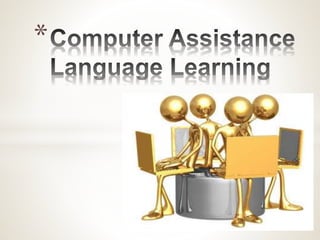
Computer assisted language learning
- 1. *
- 2. PRESENTED TO: Ma’am Mehwish PRESENTED BY: *Sadaf Syeda *Iqra Khan *Faiqa Rafique *Irum Naqvi *Iqra Shehzadi *(3rd semester)
- 3. Topic:
- 4. * • “E-learning is the delivery of education through various electronic media” (Koohang & Harman, 2005). •“E-learning is the use of electronic media for a variety of learning purposes that range from add-on functions in conventional classrooms to full substitution for the face- to-face meetings by online encounters” (Guri-Rosenblit, 2005)
- 6. 1. Access & Motivation 2.Social introduction (Culture Building) 3. Information Exchange 4.Knowledge Construction 5. Development 5 stage model
- 7. 1. Access & Motivation 2. Online socialisation 3.Information exchange 4. Knowledge construction 5. DevelopmentLink, Feedback, Search Interact Navigate, save time, personalise Receive and Send Access 5 stage model for productive learning forums
- 8. 1. Access & Motivation 2. Online socialisation 3. Information exchange 4. Knowledge construction 5. Development Guide Facilitate Lead Host Welcome 5 stage model for productive learning forums: the role of the e- moderator
- 9. *
- 10. *Access of machine and internet *Exploring the technology. *Role of e-moderator. *introducing yourself to others. *Participants bring their own language, anxieties, hopes and experiences. *The e-tutor checks that students can access and provide feedback for motivation. *The e-moderator helps meeting people and learn the environment. *Additional information and studies. *Time , energy and money saving
- 11. *
- 12. *Focuses on social processes and 'community building'. *Online interaction. *Special online community. * Bridges for all online participants. *Introduce yourself to others in your group *Online participants share and exchange their thoughts, ideas and views. *Discussions and arguments.
- 13. *
- 14. *Information is exchanged. *Interaction is encouraged. *Tasks are assigned by the instructor. *Cooperative tasks. * Identifying information which is useful for them. *Other participants and the e-moderator assists exploration activities. *Provide opportunity to exchange information *Confidence and benefit from learning in the groups. *Providing help and support for those who need it. Dr. Salmon states that “Online learners in this stage interact with the course content and interaction with the e-moderators and/or other people.”
- 15. *
- 16. *Knowledge development and discussion activities become important. *At this stage, e-moderators have imperative roles to build and maintain online groups. *Participants start recognizing the value of text-based interaction and take control of knowledge construction *heading participants toward the completion of their projects.. *Introduce challenging problems with a variety of solutions.
- 17. *
- 18. *Confident as an online learner and member of his group. *Participants become responsible for their own learning and that of their group. *Able to build on the ideas acquired. *Integrate into his own context and work place. * He enjoys looking back and learning afresh from the whole experience and preparing to set out on new journeys *.He deploys his new knowledge to demonstrate achievements in assessment. *Ideas are applied to individual contexts. *This stage is characterized by reflection and assessment.
